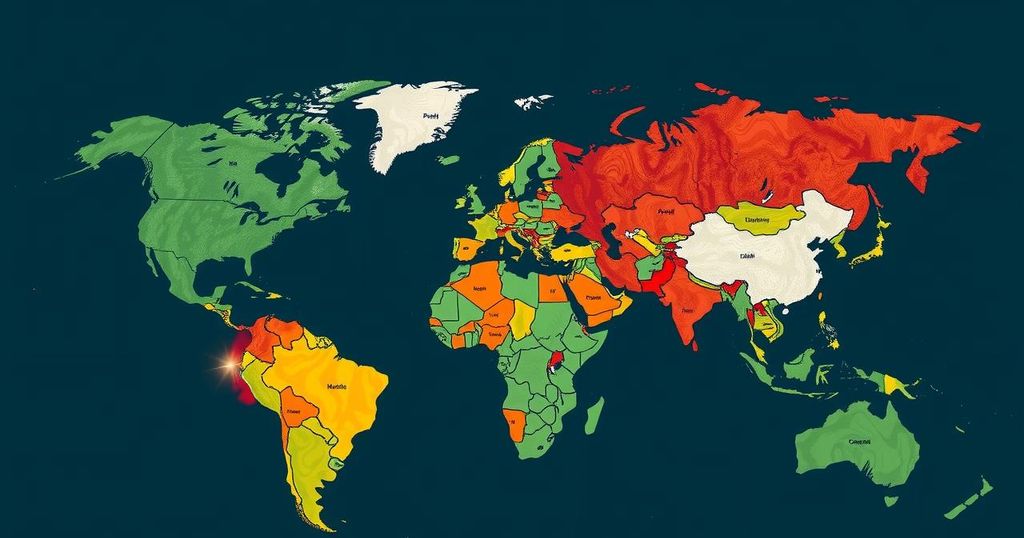Global news
ANTONIO GUTERRES, ASIA, AZERBAIJAN, BRAZIL, CLIMATE JOURNAL, ENVIRONMENTAL RESEARCH, EUROPEAN UNION, GAZA, GAZA STRIP, GEOPOLITICS, INTERNATIONAL RELATIONS, ISRAEL, LU, NISREEN TAMIMI, PALESTINIAN ENVIRONMENT QUALITY AUTHORITY, PANAMI, PARIS AGREEMENT, RIO DE JANEIRO, SANCTIONS, SOUTH AMERICA, SV, SVITLANA GRYNCHUK, UNITED NATIONS
Leila Ramsay
0 Comments
COP29 Highlights Military Spending’s Threat to Climate Action
At COP29, rich nations faced backlash for prioritizing military budgets over climate action, with critics citing a global military spending of $2.5 trillion compared to $1 trillion for climate initiatives. Environmental leaders highlighted the urgent need for prioritizing planetary protection as numerous studies reveal the increasing intensity of hurricanes attributed to climate change.
The COP29 conference held in Azerbaijan witnessed significant condemnation directed toward affluent nations for prioritizing military expenditures over investments in combating climate change. Juan Carlos Monterrey Gómez, the Panamanian climate envoy, criticized the staggering global military budget of $2.5 trillion, contrasting it with a mere $1 trillion devoted to climate action. He remarked, “Causing our own extinction is the most ridiculous thing. At least the dinosaurs had an asteroid. What is our excuse?”
Nisreen Tamimi of the Palestinian Environment Quality Authority decried the environmental devastation resulting from the Israeli bombardments in Gaza, labeling it as “ecocide.” She emphasized that environmental protection is a fundamental human right. Additionally, Svitlana Grynchuk, Ukraine’s Deputy Environment Minister, highlighted the transboundary impact of forest fires exacerbated by military activities, stating, “Nature knows no borders.”
In a parallel global discussion, UN Secretary-General António Guterres underscored the urgency of financial commitments to developing nations, linking the success of COP29 to actions taken by the world’s leading economies. Brazilian President Luiz Inácio Lula da Silva urged developed nations to accelerate their emission reduction commitments ahead of the 2050 target.
Furthermore, a recent study published in the Environmental Research: Climate journal indicated that climate change has intensified Atlantic hurricanes by an average of 18 mph in the last six years. This surge in wind speed causes storms to escalate in intensity, with potential damage correlating with hurricane categories. The findings revealed that without human-induced climate change, the likelihood of Category 5 storms would be virtually nonexistent.
This data reinforces the escalating destructive potential of hurricanes, as highlighted by Daniel Gifford from Climate Central, who stated, “The intensity of these storms is causing a lot more catastrophic damage in general. Damages do scale [up] with the intensity,” a clear indication of the direct link between climate change and severe weather patterns.
Climate change has emerged as one of the most pressing global challenges of our time, necessitating concerted efforts from all nations to mitigate its impacts. During international summits such as COP29, discussions often focus on the balance of funding between military and climate initiatives. High military spending raises concerns regarding global priorities, especially when juxtaposed against the pressing need for effective climate action to safeguard the planet’s future. Recent studies have shown that climate change is worsening the intensity and frequency of catastrophic weather events, prompting urgent calls for increased investments in environmental protection rather than conflict.
In conclusion, the stark disparity between military funding and climate action was a focal point of discussion at COP29, where critics urged wealthier nations to reconsider their spending priorities. The consequences of climate change are becoming increasingly evident, with studies linking human activities to the amplification of severe weather phenomena. Immediate action and financial commitment toward climate initiatives are essential for mitigating environmental damage and ensuring a sustainable future for subsequent generations.
Original Source: www.peoplesworld.org




Post Comment